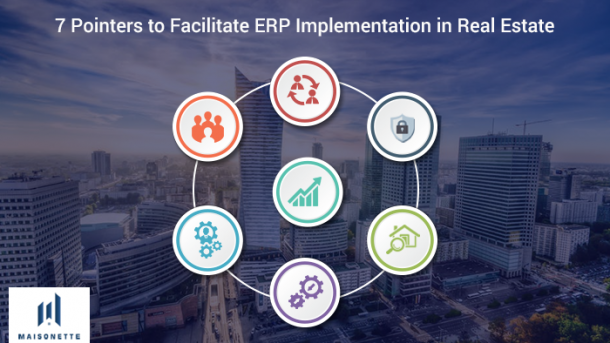An Real Estate ERP software is known to manage activities such as Sales, Marketing, Accounting, Manufacturing, Procurement, Delivery, etc. in a real estate business such that all the business processes in the organization are tied together and work in a synchronized fashion, and the result is a profitable business.
From lead generation to conversion and client management, the complete lifecycle of a typical real-estate project depends upon the efficiency of the real estate ERP software that is being used.
An Real Estate ERP Software is designed to meet the complex and heavy-duty functions of big businesses. ERP systems can be customized to fit smaller business operations as well as it can sync up with multiple departments of a large corporation to carry out the analysis of big data and match their specific needs. The ERP software has proven to boost organizational efficiency and add to profits economically.
Corporate and commercial real estate agents needed an industry-specific and targeted ERP software solution that can track various types of property and also all other procedures associated with the asset lifespan. Before implementing an ERP software to a Real Estate industry, challenges like project planning and execution, cash flow visibility, regulatory compliances, and collaboration with service providers should be taken into account.
There are a plethora of choices available for you to choose the ERP for your organization. However, the Enterprise Resource Planning (ERP) system should be such that it adequately supports the realities of your business and proposes cost-effective solutions to the problems of your company. Let’s take a look at a few pointers that need to be considered for a commendable ERP implementation.
1. Training and support post implementation:
Training on the ERP software for Real Estate is an essential step in the implementation process, especially for the employees. You must ensure proper training in place from the ERP vendor as soon as it is implemented. Learning the functionality of the software is one of the prime necessities of the users, and they might also need support and training long after the software is in place.
You must check out whether training and full support will be available through the initial days of deployment as well as ongoing support for the users if required.
2. ERP software security:
Any software comes with its security question, hence checking for how secure the software should be a question of prime importance. As a business owner, you must check how secure the Real Estate ERP software is, and how capable is it to protect the valuable and sensitive data of your company.
From payroll to financial and personal information, every data is raw, and it is a crucial responsibility to check through every new piece of software that it adheres to modern security standards and certificates.
3. Real Estate Industry Knowledge :
An ERP solution provider must have relevant work experience in your sector or industry. This will ensure effective and timely resolution to the queries about the software. Before you move on with your decision to purchase the software, you must ensure that the vendor is well-versed with the software he shares his prior implementation reference with you.
This will aid your decision in real estate ERP software implementation. You must seek an implementation partner that has proven expertise in the software itself and that will maintain a relationship of support throughout the process.
4. Integration :
Implementation of software makes the integration visible. However, it is the responsibility of the business owner to check for the compatibility of the software with the other business processes. Also, the users should be to adopt the newly added software easily. It should be able to gel up well with the pre-existing software and provide flexible access to its users. This will, in turn, reduce the extra work needed to make it coherent and allow for efficient integration.
5. Scalability & Productivity :
Productivity is a critical feature that an ERP software for Real Estate should serve. Besides being productive, it should be scalable so that you are not left behind instead stay ahead of the herd. The clients also prefer software that can be configured for flexibility to their changing needs driven by the changing economy.
Flexibility is a more desired feature compared to customizability. This feature also drives efficient utilization of the employee time thus increasing the potential productivity.
6. Staff Engagement :
The success of the ERP software deployed rides on the staff that uses it to a great extent. You must ensure that the IT staff that would directly use the software have a proper hands-on experience of the software before they use the software to reap the maximum benefits.
They should be able to standardize and automate the business processes to eliminate manual effort and time. You must ensure the comfortability level of the adoption of the new ERP software for Real Estate before it is implemented in a full-fledged manner.
7. Growth Potential :
The Real Estate ERP software has to judge on the parameter of the growth potential it would be providing. You would need to analyze the business processes and have the right foundation on which to make improvements or innovations to business processes.
The ERP software should be able to scale up your ROI as well as should grow along with your real estate business. It should be able to support growth in business areas such as product planning, manufacturing, inventory management, human resource management, supply chain management, customer relationship management and financial reporting.
To be able to launch the entire and commendable real estate ERP software all the facets, departments and areas utilizing information should be in sync together. Choosing the right software is indeed a complicated process and requires a significant amount of time and effort.
An active real estate ERP system has the potential to change the way you are doing business by streamlining the business operations while aiding common task automation giving a boost to overall efficiencies of the organization as a whole.


This article is very interesting and helpful. Thank you for sharing!